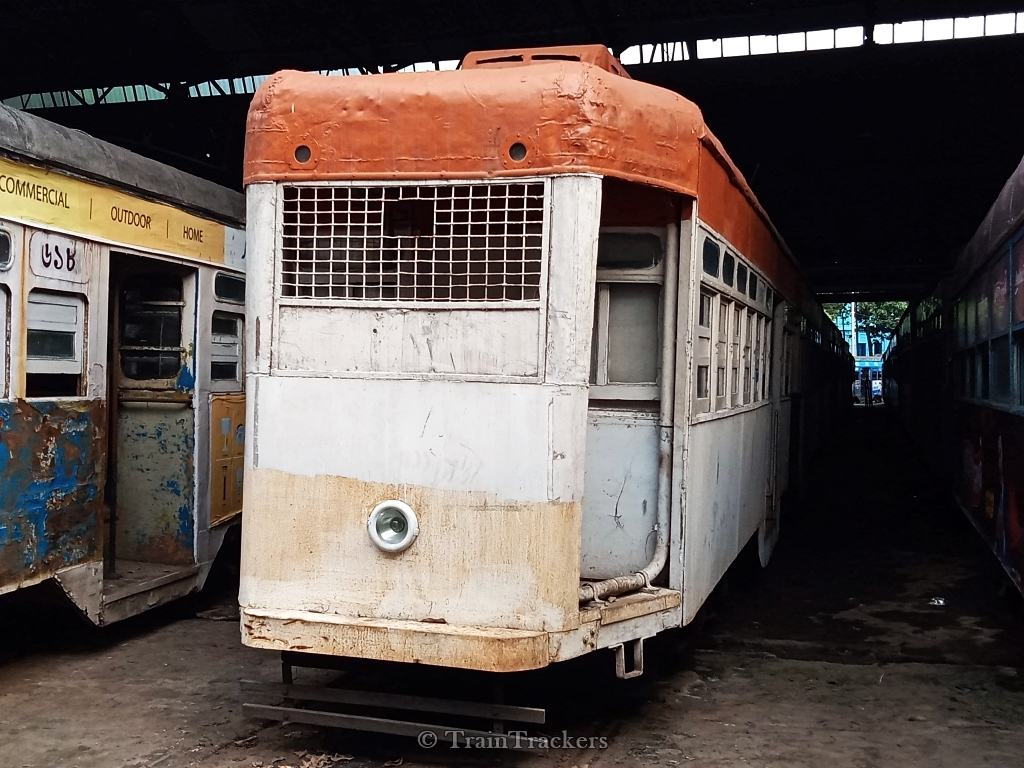
Kolkata Tram - 585 'Baghajatin' --- To commemorate the death centenary of great Bengali revolutionary Jatindranath Mukherjee - fondly remembered as Bagha Jatin an ariculated wooden-body tramcar was converted to an exhibition special and was inaugurated on 10th September 2015 exactly hundred years after the great martyr layed his life for freedom of his motherland, during a fierce gunfght with British at banks of river Buribalam. Earlier it used ply on normal passenger routes like any other tram but in late 2014 it was converted to a special tramcar by ripped-off passenger seats & modified interiors with sealed windows, vinyl posters of Indian tri-colors & LED lights etc. It was christened as Baghajatin. This tramcar was lying defunct in utter neglect inside Gariahat depot while spotted by Roy on 26th November 2019.
Jatindranath Mukherjee was born on 7th December, 1879 in the Kayagram village of the Kushtia subdivision of Nadia district of Bengal (presently in Bangladesh). As a child Jatindranath Mukherjee was widely known for his physical strength and courage. In the year 1895, Jatindranath Mukherjee joined the Calcutta Central College as a student of fine arts. It was during his college years that Jatindranath Mukherjee came across Swami Vivekananda, whose social and political thoughts later served as the inspiration for Jatindranath Mukherjee to conduct his revolutionary activities. Jatin soon became part of the Indian group assisting Sister Nivedita for British subjugation in India. It was Swami Vivekananda who realized the potential of Jatindranath Mukherjee as a future revolutionary and sent him to the Gymnasium of Ambu Guha to learn wrestling. Unhappy with the colonial educational system of British India, Jatindranath Mukherjee quit his studies in 1899 and left for Muzaffarpore as the secretary to barrister Pringle Kennedy, whose writings and historical research impressed and inspired Jatin. He was a born leader & was one of the founders of the Anushilan Samiti during his student years in Calcutta in the year 1900. In the same year he was married to Indubala Banerjee. In the year 1905 Jatin led the demonstration to make the Prince of Wales understand the ill treatment meted out to Indians by British. In 1906, Jatindranath Mukherjee learned that a leopard had settled in the jungle in the village's vicinity and was causing much trouble for people residing in Koya. Not worrying about his own life, Jatindranath Mukherjee decided to risk killing the leopard. Armed with only a khukuri (Gorkha dagger) he killed the leopard by striking the weapon on its neck, but not before he had received a number of serious wounds on his own body. This act of bravery won Jatindranath Mukherjee a silver shield with an engraving showing him killing the tiger and the famous name 'Bagha Jatin'. In the year 1908 he formed the Yugantar political party in Bengal, which was instrumental in organizing revolutionary activities against the British. 1905: Lead the demonstration to make the Prince of Wales understand the ill treatment meted out to Indians by British. When the German Crown Prince visited Calcutta, he met him and was able to get a promise on getting arms for Indian freedom struggle. Post this, he also managed to leave Calcutta and started a contracting business. This business gave him a chance to travel and consolidate/organize the district revolutionary units in Bengal. In fact, Rash behari Bose also joined him in his efforts. When the members of Ghadar Party left for India for the planned Ghadar mutiny during World War I, they were counting on the help of arms and ammunition which was promised by German government. This was directly connected with Jugantar which was under Bagha jatin’s leadership. In fact, Jugantar as an organization had already started collecting funds through a series of armed robberies. When the revolutionaries were waiting for the arms to arrive from Germany, the information actually reached the British authorities. They surrounded the place and a gunfight started between two parties. This gunfight lasted for seventy-five minutes. The fight ended with a number of casualties on both sides. Bagha jatin was seriously wounded. He later passed away in a Balasore hospital. Though it was the English rule that he was fighting against, most Englishmen loved and respected Jatindranath Mukherjee. Charles Augustus Tegart, a police officer in British India famously commented that Bengali revolutionaries are a breed of selfless political workers and Bagha Jatin was a shining example.


